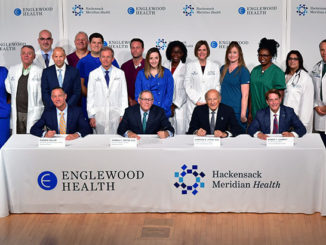
[slideshow_deploy id=’899′]
BY JOHN SNYDER
OF NORTHERN VALLEY PRESS
Hackensack, N.J.—New Jersey Health Commissioner Dr. Shereef Elnahal gave a lecture at Hackensack University Medical Center last week to update the medical community about the state’s medical marijuana program expansion and share the latest research findings.
Through lectures across the state, Elnahal said he hopes to dispel myths and reduce stigma among medical students, faculty, physicians, and clinicians by providing an overview of the program and recent expansions the Murphy administration has undertaken.
More than 100 new doctors have signed up since the expansion began in January, with 700 of the 28,000 licensed physicians in New Jersey so far registered to participate in the program.
“There is skepticism and reluctance among some members of the medical community to embrace it as a safe, therapeutic tool to treat pain,” Elnahal said in a press release.
Meanwhile, local towns are taking stands against the sale of marijuana, both recreational and medicinal.
The lecture was Wednesday, July 11 in the Hekemian Conference Center Auditorium.
Elnahal joined the Department of Health in January after serving in the U.S. Department of Veterans Affairs as Assistant Deputy Under Secretary for Health for Quality, Safety, and Value.
He received a dual-degree M.D. and MBA with distinction from Harvard University, and graduated summa cum laude with a bachelor’s degree in biophysics from Johns Hopkins University.
Elnahal said that approximately 10,000 patients have joined the medicinal marijuana program since Murphy took office, for a total of more than 25,000 patients and 1,000 caregivers participating today.
Half of the patients in the program are over 50.
Of the 10,000 patients who signed up since January, 6,300 have one of the medical conditions covered by the program at the end of March: anxiety, migraine, Tourette’s syndrome, chronic pain related to musculoskeletal disorders, and chronic visceral pain.
Post-Traumatic Stress Disorder was covered by statute.
He said medical marijuana is shown to help reduce reliance on opioid prescriptions, “saving many from a lifetime of addiction and possible overdose death.”
Studies show medicinal marijuana benefits patients with chronic pain, cancer, HIV, epilepsy, multiple sclerosis, inflammatory bowel disease and rheumatoid arthritis, among other conditions.
Two studies in the Journal of the American Medical Association showed a 6 percent decrease in opioid prescriptions in states with strong medicinal marijuana laws, he added.
[slideshow_deploy id=’899′]
Local residents saying no to dispensaries so far
Against this backdrop, communities across the state have been wrestling with whether to permit marijuana dispensaries from operating within their borders.
The Township of Washington on July 2 passed an emergency measure that forbids the sale of recreational and medicinal marijuana (and blocks so-called “head shops”) in its retail zone.
The Borough of Montvale on July 10 held a hearing on an ordinance prohibiting “marijuana establishments and vapor establishments, including the cultivation, testing, or manufacturing of marijuana or vapor products as well as advertising concerning the same.”
Medical marijuana was not specified in the ordinance, though the prospect of dispensaries was discussed in the hearing.
In June, Woodcliff Lake barred businesses from selling, distributing, cultivating, growing or facilitating the sale or use of both recreational and medical marijuana. The sale of related paraphernalia is also banned.
“This is a very important ordinance for our community that addresses a very serious issue concerning the use and sale of marijuana,” Mayor Carlos Rendo said in a published report. “It’s not about money; it’s about health and safety.”
Attorney Zachary Levy, who is watching this issue, said in February that any municipality that does not permit legal marijuana sales may not be entitled to a share of the state’s tax revenue from such sales, which could bring in $850 million a year by 2022 in the Garden State, experts estimate.
Asked whether the state was working to connect more with citizens as well as the medical community on the issue, a NJ Department of Health spokeswoman told Northern Valley Press that Elnahal is working to reduce stigma and increase access only to medical marijuana.
She forwarded a statement from Elnahal that the administration is working “to expand access to marijuana therapy responsibly, and to thousands more patients who need it.”
She said the health department is continuing its public awareness campaign to let residents know that the program has expanded.
“Talk to your doctor to see if you qualify,’’ a promoted Facebook ad states. The ad will run through the summer.
In addition, the Department of Health notes patients, caregivers, and physicians can access the program across mobile platforms so they can register, upload documents and make payments on tablets, iPhones, and other devices.
The sixth state dispensary opened in Secaucus June 18, and several satellite “alternative treatment center” locations are in the works.
“Our work is far from done,” Elnahal said in a separate press release. “With the influx of new patients, New Jersey’s medicinal marijuana market needs more competition, choice and greater value—goals that we look forward to working with all our stakeholders to accomplish.”
The first lecture in the series was held May 29 at Rutgers New Jersey Medical School. Visits will continue into September.
[slideshow_deploy id=’899′]



